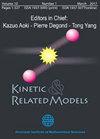具有多项式子碎片分布的破碎方程自相似解的稳定性
IF 1.5
4区 数学
Q1 MATHEMATICS
引用次数: 0
摘要
我们研究了具有幂律破碎率和多项式子碎片分布函数$p(s)$的破碎方程。分析了相应的自相似解,并推导了它们的指数衰减渐近性质和$C^{\infty }$正则性。证明了自相似解(在光滑指数衰减摄动下)随时间的急剧指数衰减率的稳定性,以及$t>0$解的$C^{\infty }$规律性。结果是基于广义拉盖尔多项式的显式展开式和对这种展开式的分析。对于无穷远处幂律衰减的扰动,也证明了其稳定性。最后,我们考虑实解析$p(s)$。本文章由计算机程序翻译,如有差异,请以英文原文为准。
Stability of selfsimilar solutions to the fragmentation equation with polynomial daughter fragments distribution
We study fragmentation equations with power-law fragmentation rates and polynomial daughter fragments distribution function $p(s)$. The corresponding selfsimillar solutions are analysed and their exponentially decaying asymptotic behaviour and $C^{\infty }$ regularity deduced. Stability of selfsimilar solutions (under smooth exponentially decaying perturbations), with sharp exponential decay rates in time are proved, as well as $C^{\infty }$ regularity of solutions for $t>0$. The results are based on explicit expansion in terms of generalized Laguerre polynomials and the analysis of such expansions. For perturbations with power-law decay at infinity stability is also proved. Finally, we consider real analytic $p(s)$.
求助全文
通过发布文献求助,成功后即可免费获取论文全文。
去求助
来源期刊
CiteScore
2.10
自引率
10.00%
发文量
36
审稿时长
>12 weeks
期刊介绍:
KRM publishes high quality papers of original research in the areas of kinetic equations spanning from mathematical theory to numerical analysis, simulations and modelling. It includes studies on models arising from physics, engineering, finance, biology, human and social sciences, together with their related fields such as fluid models, interacting particle systems and quantum systems. A more detailed indication of its scope is given by the subject interests of the members of the Board of Editors. Invited expository articles are also published from time to time.

 求助内容:
求助内容: 应助结果提醒方式:
应助结果提醒方式:


